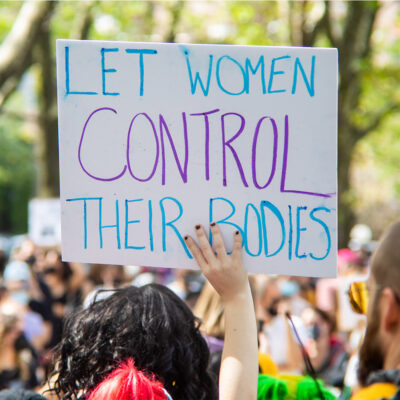
Will This Be Roe’s Last Anniversary?
January 20, 2022
Content warning: This conversation mentions sexual abuse.
January 22nd, marks the 49th anniversary of Roe v. Wade, the landmark Supreme Court case granting the right to an abortion “without excessive government restriction.” Year after year, Roe has weathered legal attacks, but this year, due to the conservative majority on the bench, the threat to Roe v. Wade is at an all-time high. A case heard by the Supreme Court on December 1st addressing a Mississippi abortion law posed a direct challenge to the precedent set by Roe. The decision will come out in June, but scholars who listened to the arguments are deeply concerned that this could be Roe’s last anniversary.
Back in 1973, Roe was an important step towards granting reproductive autonomy to people who could get pregnant. However, Roe itself, was never enough to address the long history of government surveillance over the bodies of the most marginalized. In her book, Policing the Womb: Invisible Women and the Criminalization of Motherhood, law scholar, Michele Goodwin, examines “the reproductive health and rights debate and explores how legislators increasingly turn to criminalizing women”, predominantly black women, for both proceeding with a pregnancy or for ending one.
Today, Michele Goodwin, professor of law at the University of California, Irvine, the founding director of the U.C.I. Law Center for Biotechnology and Global Health Policy and its Reproductive Justice Initiative, and one of the ACLU’s very own Executive Committee Members joins us to discuss the lived experience of reproductive control and Roe v. Wade’s impact.
In this episode
Kendall Ciesemier

This Episode Covers the Following ë–ƒVlog
-
Abortion
-
Cruel, Inhuman, and Degrading Conditions
-
Federal Abortion Legislation
-
Fighting Voter Suppression
-
Pregnancy and Parenting Discrimination
-
Pregnant Women in Prison
-
Prisoners' Rights
-
Racial Justice
-
Reproductive Freedom
-
Violence and Sexual Abuse
-
Voting Rights
-
Women and Criminal Justice
-
Women in Prison
-
Women's Rights
Related Content
-
Press ReleaseJun 2025

Prisoners' Rights
Supreme Court Strengthens Access To Justice For Incarcerated People. Explore Press Release.Supreme Court Strengthens Access to Justice for Incarcerated People
WASHINGTON ‚Äì The Supreme Court ruled today that incarcerated people have the right to a jury trial on questions about whether they had access to a prison‚Äôs grievance process when those questions are closely tied to the main issues in their civil rights cases. The decision is a step toward ensuring accountability for constitutional violations that happen behind bars. Under the Prison Litigation Reform Act (PLRA), a law passed nearly 30 years ago, incarcerated people seeking to vindicate their civil rights must exhaust the prison‚Äôs internal grievance system before they can file a lawsuit in federal court. The court's decision affirms that when disputes over exhaustion are intertwined with the facts related to the civil rights claims, plaintiffs have a right to have those questions heard by a jury. ‚ÄúToday‚Äôs decision is important for the rights of incarcerated people, who too often are blocked from having their day in court after prison officers first violate their rights ‚Äì in this case, alleged sexual abuse ‚Äì and then take steps to silence them,‚Äù said Cecillia Wang, national legal director of the ACLU. ‚ÄúThe Perttu decision is a broader victory for due process and our fundamental constitutional principle that no one is above the law.‚Äù The ë–ƒVlog, the ë–ƒVlogof Michigan, Legal Aid Society of the City of New York, and Public Justice filed an amicus brief urging the Supreme Court to uphold the Sixth Circuit‚Äôs decision that found that allowing jury trials in these contexts is in line with the PLRA and the Seventh Amendment, which guarantees the right to a jury trial. ‚ÄúIncarcerated people rarely get a chance to hold the government accountable for abuses in prison. In too many cases, courts are quick to accept the word of prison officials over incarcerated plaintiffs before the facts are fully heard,‚Äù said Jennifer Wedekind, senior staff attorney at the ACLU‚Äôs National Prison Project. ‚ÄúToday's ruling will ensure that more incarcerated plaintiffs finally get their day in front of a jury.‚Äù The ACLU‚Äôs brief also pushed back against the state‚Äôs argument that this ruling would lead to a flood frivolous of litigation, explaining that it only applies in a limited universe of cases, that empirical evidence conclusively refutes the state‚Äôs arguments, and that efficiency should not be a factor in assessing whether plaintiffs have a right to a jury. This case is a part of the ACLU's Joan and Irwin Jacobs Supreme Court Docket.Court Case: Perttu v Richards -
Press ReleaseJun 2025

Prisoners' Rights
LGBTQ Rights
Federal Judge Temporarily Enjoins Federal Prison Officials From Withholding Health Care From Incarcerated Trans People. Explore Press Release.Federal Judge Temporarily Enjoins Federal Prison Officials from Withholding Health Care From Incarcerated Trans People
WASHINGTON ‚Äì A federal district court judge has granted a preliminary injunction blocking enforcement of a Trump Administration executive order prohibiting federal Bureau of Prisons (‚ÄúBOP‚Äù) officials from providing gender-affirming hormone therapy and accommodations to transgender people. The injunction does not require BOP to provide gender-affirming surgical care. The court also granted the plaintiff‚Äôs motion for a class certification and extended injunctive relief to the full class, which encompasses all persons who are or will be incarcerated in BOP facilities and have a current medical diagnosis of gender dysphoria or who receive that diagnosis in the future. ‚ÄúThis is a critical ruling for our clients and all transgender people in Bureau of Prisons custody,‚Äù said Corene Kendrick, Deputy Director of the ACLU‚Äôs National Prison Project. ‚ÄúThis administration‚Äôs cruelty towards transgender people disregards their rights under the Constitution. The denial of medically necessary health care, including gender-affirming health care, to people in prison is a violation of their fundamental constitutional rights. We will continue to advocate for the rights of all incarcerated people.‚Äù ‚ÄúToday‚Äôs ruling is made possible by the courageous plaintiffs who fought to protect their rights and the rights of transgender people everywhere,‚Äù said Shawn Thomas Meerkamper, Managing Attorney at Transgender Law Center. ‚ÄúThis administration‚Äôs continued targeting of transgender people is cruel and threatens the lives of all people. No person‚Äîincarcerated or not, transgender or not‚Äîshould have their rights to medically-necessary care denied. We are grateful the court understood that our clients deserve basic dignity and healthcare, and we will continue to fight alongside them.‚Äù "Today's ruling is an important lifeline for trans people in federal custody," said Michael Perloff, Senior Staff Attorney at ACLU-D.C. ‚ÄúThe ruling is also a critical reminder to the Trump administration that trans people, like all people, have constitutional rights that don't simply disappear because the president has decided to wage an ideological battle." Following a January 20 executive order from President Trump that prohibited gender-affirming care for transgender people in federal prisons, the BOP issued a policy stating that "no Bureau of Prisons funds are to be expended for any medical procedure, treatment, or drug for the purpose of conforming an inmate‚Äôs appearance to that of the opposite sex.‚Äù It also prohibits clothing and commissary items it deems inconsistent with a person‚Äôs assigned sex, and requires all BOP staff to misgender transgender people. In March, two transgender men and one transgender woman serving sentences in facilities in New Jersey, Minnesota, and Florida filed a class action lawsuit against the Trump Administration and BOP, challenging the Executive Order and new BOP policies prohibiting their access to gender-affirming care. The class action lawsuit was filed in federal court in Washington, D.C., on behalf of approximately 2,000 transgender people incarcerated in federal prisons across the United States. All three plaintiffs were diagnosed with gender dysphoria by BOP medical providers and prescribed hormone therapy by health care staff, but either had their treatments suspended or were told they would be suspended soon. The filing argues this policy violates the Eighth Amendment‚Äôs prohibition on ‚Äúcruel and unusual punishment,‚Äù which federal courts have long held includes the denial of medically necessary health care, including access to gender-affirming care. It also argues that the policy violates the equal protection requirement of the 5th Amendment, the Administrative Procedure Act, and the Rehabilitation Act. The case was filed on behalf of the three plaintiffs and all other transgender people in federal prisons by the ACLU, the ë–ƒVlogof DC, and the Transgender Law Center. BOP also instructed officials to remove any transgender women held in women‚Äôs facilities and place them in men‚Äôs facilities, an issue under challenge in multiple separate lawsuits. Today‚Äôs order from the court can be found here.Court Case: Kingdom v. Trump -
TennesseeMay 2025

Criminal Law Reform
Prisoners' Rights
State V. Bishop. Explore Case.State v. Bishop
This case presents two questions: first, whether, under the Fourth Amendment to the U.S. Constitution and Article I, section 7 of the Tennessee Constitution, Union City Police Department officers possessed probable cause to conduct a warrantless search of the defendant‚Äôs vehicle based exclusively on the alleged odor of cannabis, and second, whether the Court of Appeals had jurisdiction to overturn the defendant‚Äôs conviction. The ACLU‚Äôs Criminal Reform Legal Project and State Supreme Court Initiative, along with the ë–ƒVlogof Tennessee filed an amicus brief arguing first, that after Tennessee‚Äôs legalization of hemp in 2019, an officer‚Äôs alleged detection of the odor of cannabis is insufficient to establish probable cause to conduct a warrantless search of a vehicle in Tennessee, and second, that the court of appeals improperly held that it lacked jurisdiction to overturn the defendant‚Äôs conviction.Status: Ongoing
